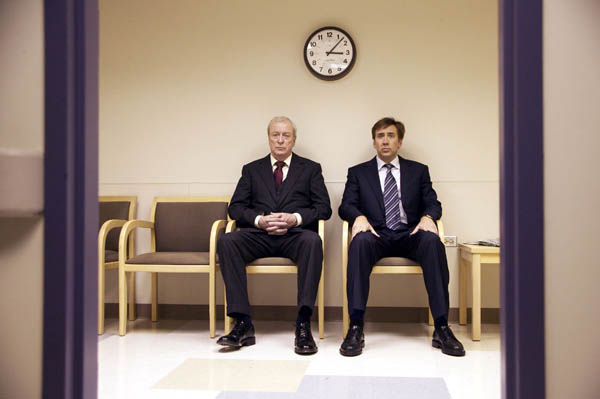Movie review by Greg Carlson
Cold, blustery, and with occasional gusts of unwelcome wind, “The Weather Man” doesn’t forecast an enjoyable time at the cinema. A strange cocktail of gloomy, woe-is-me navel-gazing and droll, observant comedy, Gore Verbinski’s latest film is more likely than not to keep the director trained on helming the “Pirates of the Caribbean” franchise, and away from introspective character studies. “The Weather Man” is not awful by any means, but the strain of delivering a convincingly sympathetic story with a privileged, successful, white male at its center turns out to be more than Verbinski, screenwriter Steve Conrad, and star Nicolas Cage can handle.
With its nervous Hans Zimmer score and the austere photography of Phedon Papamichael, “The Weather Man” aspires to an “American Beauty” level of artfulness. The movie’s narrative, however, seems to have much less at stake than “Beauty,” and unlike that film, only a single character is explored in depth. Cage’s performance as Dave Spritz, a Chicago TV personality whose personal life is in shambles, is solid as ever, but Spritz is so irritable as to become irritating, and the result often alienates him from the viewer. The filmmakers also miscalculate the effect of the voiceover narration, in this case a completely unnecessary addition at turns mawkish and grating.
Despite the fact that his job is easy to perform and financially lucrative (he is even in the running for a plum spot on a national morning program hosted by Bryant Gumbel, who turns up in an odd cameo appearance), Dave sees himself as insignificant and his career path as trivial. Constantly trying to measure up to his ailing father Robert (Michael Caine), a National Book Award and Pulitzer Prize winner, Dave believes his own failed marriage is a disgrace. His ex-wife Noreen (Hope Davis) has moved on, and he strains to connect with his two kids, both of whom deal with awkwardly contrived, plot-device problems.
“The Weather Man” wants to be taken pretty seriously, so it is somewhat puzzling why one of the movie’s running gags is the sight of Dave being pelted by all manner of fast food: hot apple pies, milkshakes, Big Gulps, and other assorted edibles adorn Dave’s coat far more often than one believes is reasonable – even in a market the size of Chicago. Perhaps the film is trying to say something about the cost of minor celebrity (one piece of narration leads Dave to identify himself with the disposable nature of the disgusting victuals heaved at his person), but the frequency of the bombardments rings false.
Verbinski milks a great many take-them-or-leave-them symbols for all they are worth. Dave’s interest in archery wavers between a calming, Zen-like tonic and a borderline psychotic outlet for misplaced rage. The director also develops another genuinely strange preoccupation with the phenomenon of the “camel-toe,” which factors more prominently than one initially expects. Another subplot concerning a pedophile drug counselor seems dropped in for good measure, but none of this material ultimately satisfies. The result is a film that leaves the viewer as out of sorts as its frustrated, confused protagonist.
